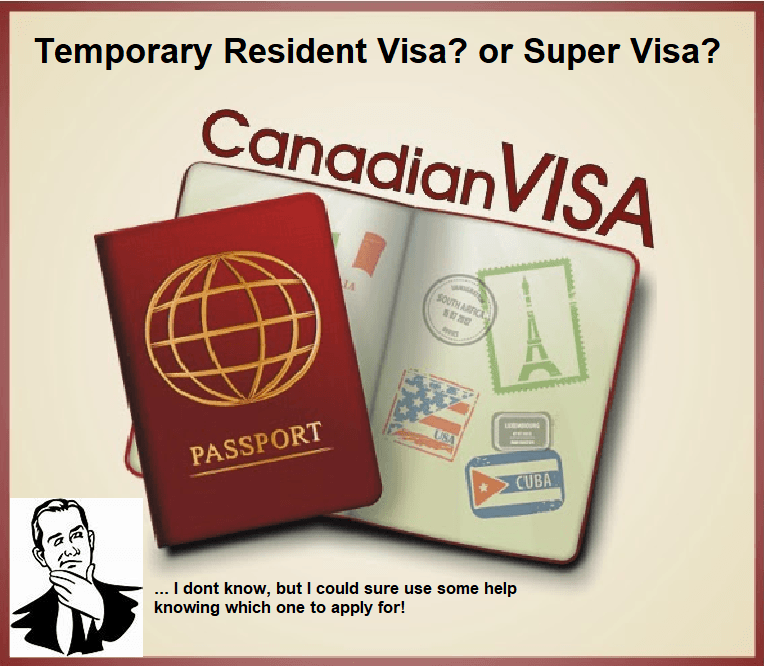Difference Between A Super Visa and A Temporary Resident Visa
What Type of Visa Will I Need to Come to Canada?
Are you considering a trip to Canada in the future? Are you wondering what you’ll need to do to be ready for the big trip? There is a lot to consider when preparing for a visit to Canada, and depending on your circumstance, the things you’ll need to do to be ready may be different than another individual preparing to visit Canada as well. It is important to understand that the things you’ll need to do to prepare, depend entirely on your specific circumstances. For example, it will matter whether you are travelling from a visa-exempt, or a non-visa exempt country. It will also matter what you intend to do while you’re in Canada, and how long you wish to stay. Therefore, this article will aim to break down the different processes individuals who would like to visit Canada most commonly go through.
What Is A Temporary Resident Visa?
A temporary resident visa (TRV) is often also referred to as a visitor’s visa. A temporary resident visa is needed for any individual who would like to visit Canada and is coming from a non-visa exempt country. A temporary resident visa will generally allow you to stay in the country for a 6 month period maximum. If your temporary resident visa is valid for a different length of time, it will be clearly indicated on the visa. It is very important to review your approved temporary resident visa carefully, to ensure you understand exactly how long it permits you to stay in Canada. Also, a temporary resident visa only allows you to enter the country once, and then stay for up to 6 months. You are not permitted to leave and re-enter the country, unless you apply for and receive an approved multiple entry visa.
If you come from a visa-exempt country, and only want to enter the country for 6 months or less, you do not need to apply for a temporary resident visa to do so. Rather, you will most likely need an approved electronic travel authorization to be permitted to enter the country.
What Is A Super Visa?
A super visa, also known as a parents or grandparents super visa, is essentially a special multiple entry visa. Like a multiple entry visa, a super visa is generally valid for up to 10 years from the time it is issued. Though, unlike a multiple entry visa, you are permitted to stay for up to 2 years from the time you enter the country, before you must leave. In terms of how long one is permitted to stay in Canada once they arrive, a multiple entry visa is the same as a temporary resident visa. You are only permitted to remain in Canada for up to 6 months from the time you entered. The fact that a super visa allows you to remain in the country for up to 2 years from the time you enter is the most important difference between a super visa and a temporary resident visa or a multiple entry visa.
If you come from a visa-exempt country, but wish to stay for longer than 6 months to visit your child or grandchild, you must apply for a super visa to be permitted to reside in Canada longer than 6 months.
Am I Eligible For A Super Visa?
To qualify for a super visa, there are more strict requirements to meet than if you are applying for a temporary resident visa. With a super visa, as mentioned, you must be either a parent or a grandparent of a Canadian citizen or a permanent resident. Whereas with a temporary resident visa, you do not necessarily need to be seeking entry to the country to reunite with a child or grandchild. With a temporary resident visa, you may seek entry to the country on a temporary resident visa for simple tourism, to visit any relatives, or for a short business trip.
What Do I Need To Apply For A Super Visa?
In addition to needing to come to Canada to visit a child or grandchild, there are other requirements you must meet if you are applying for a super visa. Applications for a temporary resident visa generally are not subject to the same requirements. For example, if you are applying for a super visa, you must have a letter of invitation from your child or grandchild, stating they are going to be your host while you are in Canada. This letter of invitation must state that the host is going to be financially responsible for you while you are in Canada. At the same time, the host must provide proof that they meet the low income cut-off (LICO) threshold which applies to them, depending on how many individuals live in their home. To apply for a visitor’s visa, there is no LICO threshold you must meet. Rather, it must be clear in your application that you are financially equipped to pay for your visit to Canada and pay for your return home as well.
Also, as applicants for a super visa you will need to retain private medical insurance to cover your health issues, should any arise while you are in Canada. Your private medical insurance must cover a minimum of $100’000 in medical expenses, and be valid for at least 1 year from the time you arrive in Canada.
Finally, to apply for a super visa, you are subject to all the requirements any individual is when seeking entry into Canada. In other words, you are also subject to all the requirements as individuals applying for a temporary resident visa. For example. this means an immigration officer must believe you intend to leave at the end of your stay, as you have only requested access to Canada for a specific period of time, whether you are applying for a super visa or a temporary resident visa. You should do this by showing you have strong ties to your home country regardless of what type of visa you are applying for.
Travelling With a Super Visa or a Temporary Resident Visa
Regardless of the type of visa you are entering the country with you must have a valid travel document, such as a passport. A visa is not a valid travel document and you will not be permitted to enter the country without one.
Also, it is important to be aware that it is at the discretion of a Canadian Border Service Agent (CBSA), to allow you to enter the country. Having all the required documentation does not mean you have a right to enter the country. If for any reason a border services agent feels you have misrepresented yourself in your visa application, or you do not intend to stay in the country temporarily, they have the authority to deny you entry. That is why it is crucial individuals complete visa applications completely and honestly, and have a good understanding of what is required of you to be permitted to enter the country.
Contact Akrami and Associates
A super visa is a wonderful tool the Canadian government has given to individuals who have loved ones living permanently in Canada, to be able to spend more time together. Though, it is very important you understand the difference between a temporary resident visa and a super visa, to ensure you only apply for a super visa if you are eligible for the parent and grandparent super visa program. Failing to understand exactly which process is the best for you could result in increased processing times, and ultimately mess up your plans to visit Canada when you intended to do so. Therefore, we recommend that you seek out professional and experienced help before attempting to apply. Here, at Akrami & Associates, we work and have experience with many different immigration issues. We have helped many of our clients reunite with their loved ones using a super visa, or simply travel to Canada on a temporary resident visa. If you believe that you may be eligible to apply for either a Temporary Resident Visa or a super visa, or are unsure of the application that is best suited to you, please feel free to contact Akrami & Associates at our office at 416-477-2545 for more information, or if you would like to book a consultation with an immigration professional for more advise.
With Akrami & Associates, there is always a way!
Latest Immigrations News

December 5, 2025
THE ULTIMATE GUIDE TO HUMANITARIAN & COMPASSIONATE (H&C) APPLICATIONS IN CANADA
THE ULTIMATE GUIDE TO HUMANITARIAN & COMPASSIONATE (H&C) APPLICATIONS IN CANADA Understanding When, Why, and How to Apply for Permanent Residence on Humanitarian Grounds What Is an H&C Application? A Humanitarian and Compassionate (H&C) application is a last-resort pathway for individuals who are in Canada and do not [...]

September 11, 2025
Canada Super Visa: Step-by-Step Guide for Parents and Grandparents
For many Canadian citizens and permanent residents, bringing parents or grandparents to Canada for extended visits is more than just a wish, it’s a heartfelt need. While most people first consider the traditional visitor visa, there is another option designed specifically for family reunification: Super Visa applications. [...]

August 23, 2025
Intra-Company Transfer (ICT) Work Permit, Your Complete Guide to Working in Canada
For multinational companies, moving key talent across borders is often essential for growth and operational success. The Intra-Company Transfer (ICT) Work Permit provides a streamlined pathway to bring experienced employees to Canada without the time-consuming Labour Market Impact Assessment (LMIA) process. For foreign professionals, it’s more than [...]

Book a Conslutation
One of our Representatives will
assist you with your matter. Book Now!
Click here

Call us for
more Information
+1-416-477-2545
Toll Free: 1-877-820-7121
Click here

Write Us (Online Form)
Complete our form and one of our
Representatives will contact you.
Click here
Subscribe To Our Newsletter





